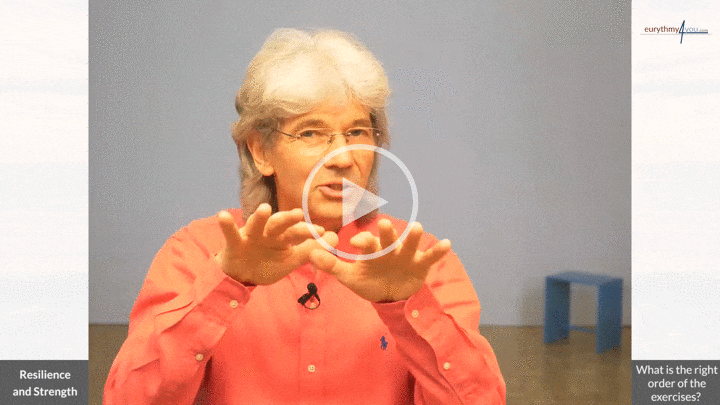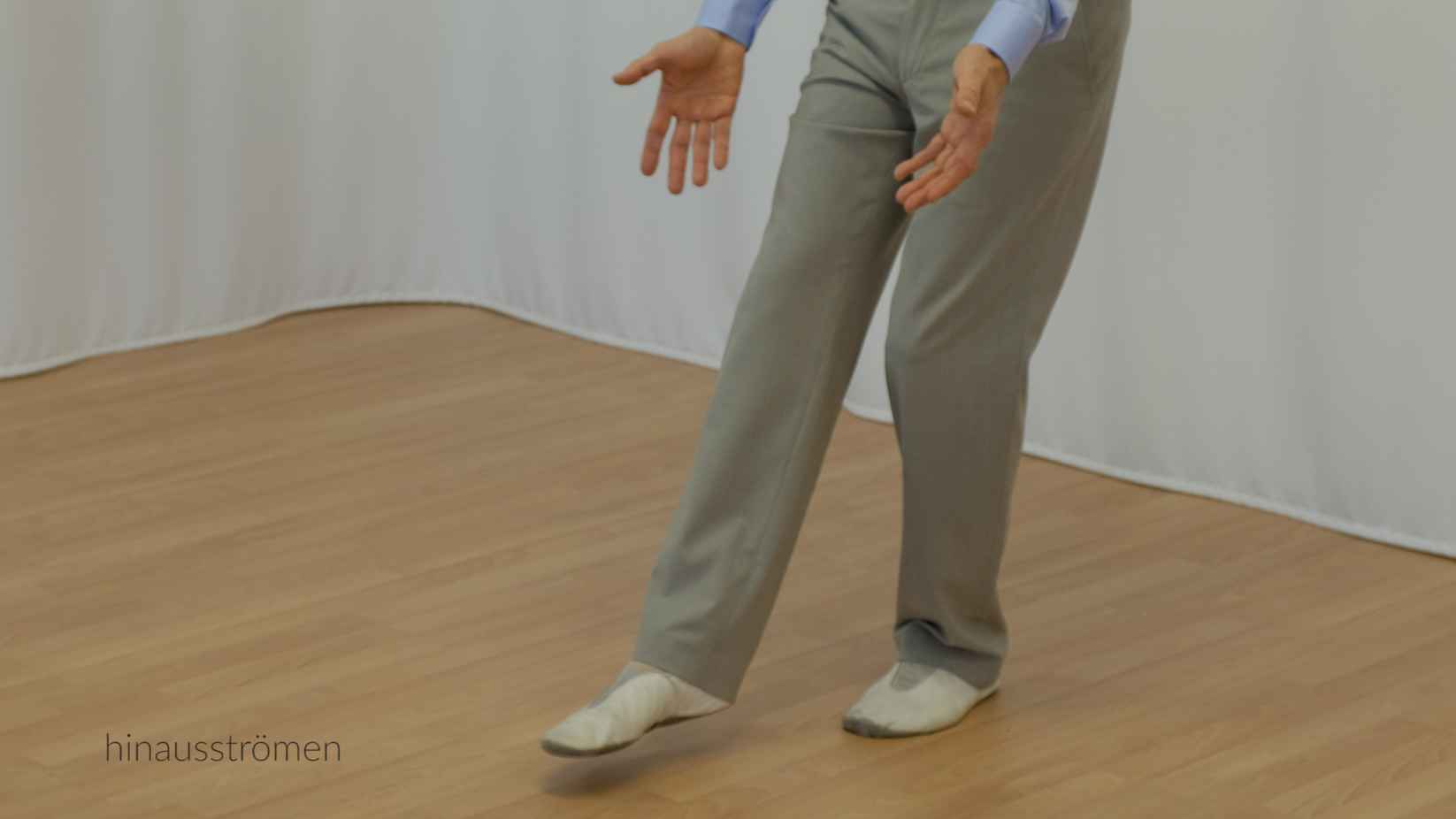The exercises as given by Rudolf Steiner.
Yes and No
Today we will go over to some of those eurythmic exercises more related to the activity proceeding from the soul. Before we begin, however, it will be necessary to take note that it is usually assumed when a person produces an expression of will or when he arrives at a judgment, that these expressions are connected with the human nervous system alone. This, however, is not at all the case; one must make it clear to oneself that the judgments which the human being passes, for example, are bound up with his entire constitution; that man pronounces a judgment out of the totality of his being. Thus when one makes the eurythmic movement corresponding to a judgment, here again, the whole human being is influenced in a certain manner; it is not only the head which will be subject to the influences of what arises through judging eurythmically.
Mrs. Baumann will show us the movement which corresponds to confirmation, and then the one corresponding to negation. Naturally it should be carried out several times without interruption when used as therapeutic exercise. Now this confirmation and negation is precisely that which can be called a judgment; when one confirms or negates something one has to do with the nature of judgment in its essence.
When you give such a confirmation or negation, the movement works, when it is repeated frequently, by way of a detour through the etheric body very strongly on the respiratory system. One can by this means counter a tendency to shortness of breath. You can for example repeat the confirmation ten times consecutively, then the negation, and follow this up with confirmation, negation, confirmation, negation — both ten times consecutively. Whatsoever illness this shortness of breath may be the symptom of, by this means one will be able to counteract it in such a way that the entire constitution is affected as the whole matter occurs by way of a detour through the etheric body.
You must only keep in sight what is being done here. One could interpret what Mrs. Baumann has done touching upon what is essential in it as follows: what she projects thereby into the world is a thought that has become fleeting, a thought which has gained wings and gone over into movement. When a judgment is fixed eurythmically — as a confirmation or negation — then it is a thought which rides on the movement. And because the thought rides on the movement one projects in fact on the one hand, a part of this being outwards; on the other hand, because the thought rides on the movement one takes a part more thoroughly into oneself than otherwise.
That is to say, one makes a movement through which one becomes more awake than one otherwise is. Such movements are actually movements that awaken. However, because one does not wake up with the ego at the same time in the same manner, the activity of the ego is in a certain way dampened. This dampening of the ego is not absolute, however, but in relation to the organism. In fighting shortness of breath by means of this detour through the etheric body this constitutes what would be the first symptom reached and what is introduced into the whole human constitution by means of the byway through the etheric body.
Sympathy and Antipathy
Now a disposition of the will:* sympathy and antipathy. Now imagine you make this movement repeatedly, one after another: sympathy, antipathy, sympathy, antipathy, or only one of these two. When one does this, in a certain sense one is setting out something which one carries within oneself; naturally this can only be confirmed through observation. It is a sort of falling asleep.
The other movement (confirmation and negation; the ed.) must be carried out quickly, and this must be carried out slowly. It is indeed a movement which brings forth the imagination of sleep in the observer; imaginatively one falls asleep in a way with such a movement — not in reality, however, at least that shouldn't happen.
But because one in reality doesn't go to sleep while making this movement, the “I” is more strongly active in relation to the body than it usually is. And by means of such a movement the circulation and the digestion as a whole are stimulated. The entire digestion is really stimulated in such a manner that through such a movement the tendency to belch, for example, can be counteracted.
Love and E
Now we want to express that which one could call the feeling of love towards something (Mrs. Baumann). Take a good look at this, the feeling of love for something. Imagine it carried out ten times consecutively and accompanied by a powerful E between each of the movements. Thus, Love-E, Love-E, and so on, one after another.
You accompany the movements which you have learned as expressing feeling in eurythmy — it could be another feeling as well — with the movement for E.
Here we have a strong influence which proceeds from the human etheric to act on the astral nature and which has the effect of warming the circulation. It is something which really works on the circulatory system in a beneficial manner. One cannot say that it accelerates or retards the circulation; it affects it in a beneficially warming manner.
Hope and U
We also have something which could be called a wish: Hope. (Miss Wolfram) Look at this and picture to yourself that one carries out this movement for the wish repeatedly — always returning to the position of balance, then carrying out the movement for the wish again — and always alternating it with the movement for U. This means that the astral will act very strongly upon the etheric and it can be said that a beneficial warming effect on the breathing system will result.
Effects
Naturally one must take into consideration that all these things of which we have spoken today occur by way of the etheric body and can, therefore, never show what effect they have on the following day. Some effects may appear after two to three days and are then, however, all the more certain.
One must keep in mind that what we have demonstrated today as decision, expression of will, hope, love, what we have shown in respect to certain organic pains, what we have demonstrated as a means of combating clumsiness and so on, all these things are related to man in such a way that the human being is gripped through them in the innermost part of his organic being and by way of a detour through the etheric body actually derives the possibility of making this etheric body into a workable instrument.
The etheric body is a part of man which becomes stiff in most of those people who sit out their lives, spend their lives without interest for their surroundings. And it is not good when the human etheric body becomes stiff; nor for the organic functions is it good.
When one has the exercises which we have described today carried out by children in moderation and by the appropriate patients very energetically (one can see by the indications given which patients have need of them), the etheric body will become supple and inwardly flexible. And by means of them one will do the children as well as the adults a good service.
In order that there be no misunderstanding, I emphasize that of course the opinion must not arise that these exercises would have a very significant effect after being carried out for two or three days. That would be an error. In order to produce an effect, these exercises should be carried out for at least seven weeks. Thus one can maintain — without necessarily being mystically inclined — that the space of time necessary for the beneficial effects just described to show themselves would be about seven weeks.
Excerpt from Rudolf Steiner, Eurythmy Therapy. This translation by Kristina Krohn in collaboration with Dr. Anthony Degenaar has been made from the German Fourth Edition, 1981.
View full lecture here.
View all lectures here.
* Willenszustimmung



















































